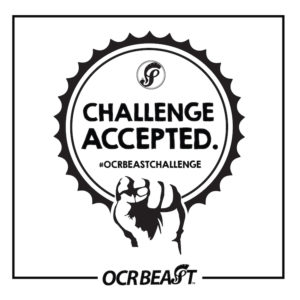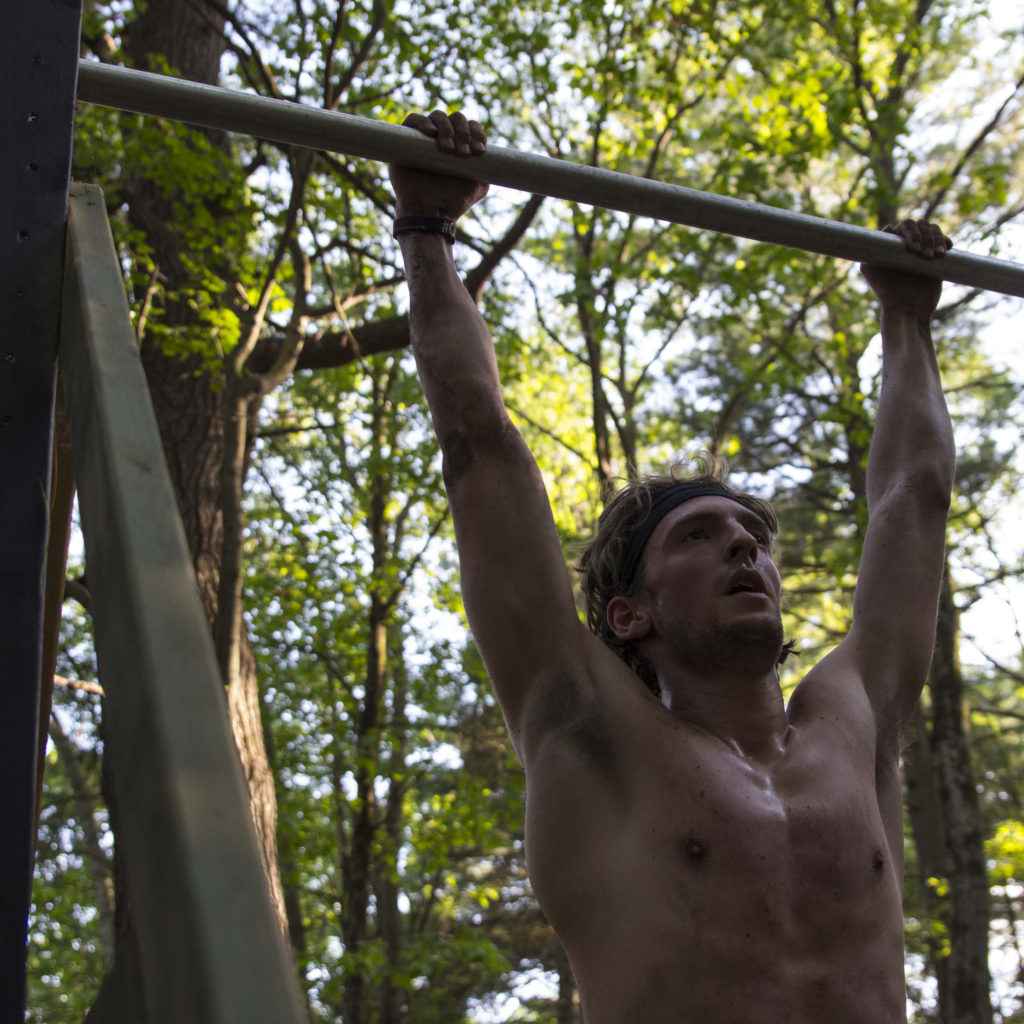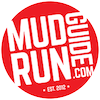 If you haven’t tended to sore hands, massaged burning forearms or checked Instagram in December, you probably haven’t heard of one of the most grueling training challenges proposed to OCR enthusiasts. The brainchild of OCR Beast founder and coach, “Spartan” Spencer Mahoney, the Dead Hang Challenge focuses on developing improved grip strength and of course, those epic “Popeye forearms.”
If you haven’t tended to sore hands, massaged burning forearms or checked Instagram in December, you probably haven’t heard of one of the most grueling training challenges proposed to OCR enthusiasts. The brainchild of OCR Beast founder and coach, “Spartan” Spencer Mahoney, the Dead Hang Challenge focuses on developing improved grip strength and of course, those epic “Popeye forearms.”
On December 1, 2017, participants began their journey with a one-minute dead hang. Every day in December, ten seconds is added to the previous days’ time – December 2 is 1:10; December 3 1:20, etc. – eventually tallying a hang time of six minutes on New Year’s Eve. The daily hang times are cumulative for that date, meaning you can hang straight through or break it up into sets. If you can hang for 6 minutes on December 31 unbroken, I assume you’ll have few problems with any grip-based obstacle on the course in 2018!
Free of charge, once you officially register to join in the Dead Hang Challenge, you receive time stamps that can be shared on social media, plus the opportunity to win some great OCR-focused prizes from OCR Beast’s partners, as you utilize the #OCRBeastChallege hashtag on social media.
I had the opportunity to speak with Spartan Spencer to dive a little deeper into the challenge, and had to type this up newly earned (and extremely sore) Popeye forearms and hands. Check out his responses and make sure you get your hangs in before 2018!
Mud Run Guide: Can you give the OCR community a little background on you and OCR Beast Training?
Spartan Spencer: “I did my first race in 2012. At the time, I was out of shape, smoked cigarettes, and had no experience running or working out. In 2013 I started messing around with running and strength training, and completed my Spartan Race trifecta. In 2014 I ran more than 20 Spartan Races and never looked back. During this time, I kept a journal of my transformation on Instagram, and I was contacted by hundreds of people saying they were motivated by my journey, asking me for advice on how to quit smoking, and get in better shape. Ever since, my goal has been to continue pushing myself to be the best that I can be, while also helping others do the same. In the last two years, I became certified as a personal trainer, got my Crossfit L1 certification, competed as the team captain on Spartan: Ultimate Team Challenge (2nd place in both seasons), and got married to my best friend!
OCR Beast started after I had an “aha moment.” After three months of being coached in running by my friend and now OCR Beast coach Shane Leighton, I couldn't believe how much I had progressed. Like I said, running and strength training was all new to me when I got into OCR, and while there is a lot of common knowledge out there when it comes to strength training, it amazed me how little I ever learned about running in the two years I was training for OCR. One day, I asked myself, “why doesn't everyone train like this?” We then set out to bring personal coaching for running and strength training online, for all athletes. It's been fun to continue pushing myself as an athlete and coach, and I love all the athletes we have on our team!”
MRG: What inspired you to develop the dead hang challenge?
SS: “The Dead Hang Challenge was born after realizing a similar need in OCR that I saw in proper run coaching. People are always talking about grip strength, but it seems they only assume it means doing some pull-ups, or a dead hang every now and then. There was no structure in grip-based training. At the same time, I saw so many challenges happening on Instagram that the OCR community was participating in, but none of them were properly translating into OCR the way I thought a challenge should.”
MRG: Why is grip strength so important in OCR? How will dead hanging improve the competitive nature of OCR enthusiasts?
SS: “Grip strength has always been a topic in OCR, but after this year, especially with the band-breaking OCRWC courses, and Spartan obstacles like Twister, Olympus, and Monkey in the Middle, it's pretty apparent that grip strength obstacles are here to stay, AND getting more and more challenging. Grip strength is an all-encompassing term we use, but really all of these obstacles I just mentioned required hanging grip strength, the ability to move your bodyweight through an obstacle, while hanging.
While doing dead hangs alone will not necessarily prepare you for the more technical hanging grip strength obstacles, I like to think of dead hangs as a great base builder. They are an easy way to gain initial hand and forearm strength and endurance, plus they provide you enough foundation to start adding in more difficult movements, such as one-arm hangs, hanging maneuvers and tougher holds. Dead hangs are a great first step in becoming comfortable holding your bodyweight while hanging, which is crucial for OCR.”
MRG: How many people have committed to the #OCRBeastChallege?
SS: “As of today, we are officially just under 2,000 participants, but we continue to grow the numbers daily!”
MRG: There are more than 6,000 hashtag mentions for your challenge today. Did you think it would reach so many people? Why has it been so successful?
SS: “Yes and no. This is our second year doing the Dead Hang Challenge, and last year the response exceeded our expectations, even though it wasn't nearly as well thought out. I'd be lying to you if I thought almost 2,000 people would commit to the challenge this year; I expected something more like 800-1,000 to be realistic.
I honestly think there is no limit to how many this challenge can reach. Reason being: the challenge just resonates in the sport. Everyone immediately realizes that it's going to benefit them. It is definitely a challenge, and not going to be easy, but it is doable if you put in the time. Things like the time stamps, giveaway prizes, and weekly themes help us expand our reach. If someone posts about the challenge on Instagram and all their friends see it, someone is going to be interested, and then it just spreads from there. Plus, when we announced the challenge this year, last year's participants were so vocal about how much it helped them in their training, which really helped convince others to accept the challenge. I look forward to next year when we have 2,000 people ready to take on the challenge again and talking about how much it helped them!”
MRG: My forearms are burning and I’m looking forward to January 1 when I can put 6 minutes of hanging behind me! What should participants do to recover during and after the challenge?
SS: “The most important thing to do is work the opposite muscles from the ones that we're utilizing with all these hangs. Just like any other muscle group, you want to keep things balanced (think pulling vs pushing movements). You want to work your extensors by adding resistance when opening your hand. From there, shoulder mobility, stretching and hand care are also important.”
Read Spencer’s article on recovery here: https://www.spartanspencer.com/blog/5-dead-hang-challenge-recovery-tips\
MRG: How can participants maintain their new-found forearm strength in 2018?
SS: “The most effective way, in my opinion, is to purchase the OCR Beast Grip Builder 101 program. (Sorry – cheap plug, but also true)
I like to think of the results of the dead hang challenge as a great grip base to build upon. Now that you're able to hold your body weight for longer periods of time, you're able to start working on things like weighted hangs, one arm hangs, more difficult holds (nunchucks, ropes, rings, etc.), and start practicing things like transitions, monkey bars, and just being able to move your body in any given way while hanging.
The most important thing is however you do it, figure out how to work it into sets like you would any other strength training routine. Harder holds for shorter periods of time work on strength, and easier holds for longer periods of time help with endurance. Switch up what you're doing, but make sure you're recording it so you can look back and see how you're progressing.”
MRG: Are you planning any future challenges?
SS: “The short answer is yes, although I don't want to start watering them down.
I have a few ideas, on one hand I'm thinking about ongoing challenges that address certain needs in OCR. They'd be almost like an accessory to the training most athletes are already doing now, but would help learn a new skill, work on a weakness, etc.
On the other hand, in terms of big community challenges like the Dead Hang Challenge, I'm thinking one or two more per year, but only if we can come up with something that will truly benefit the OCR community the same way hanging for 108.5 minutes in a month does (but who's counting!?).”



I participated in the challenge last year and didn’t fail a rig all of 2017! The twister though gave me some issues, but I believe after the dead hang challenge this year I won’t fail the twister either. Kudos to Spencer and his company, and the community around the challenge. I can’t think of a better structure. Thanks OCRBeast!
Looks like all of the sore forearms and hands pay off! Congrats and best of luck in 2018, Sandy!